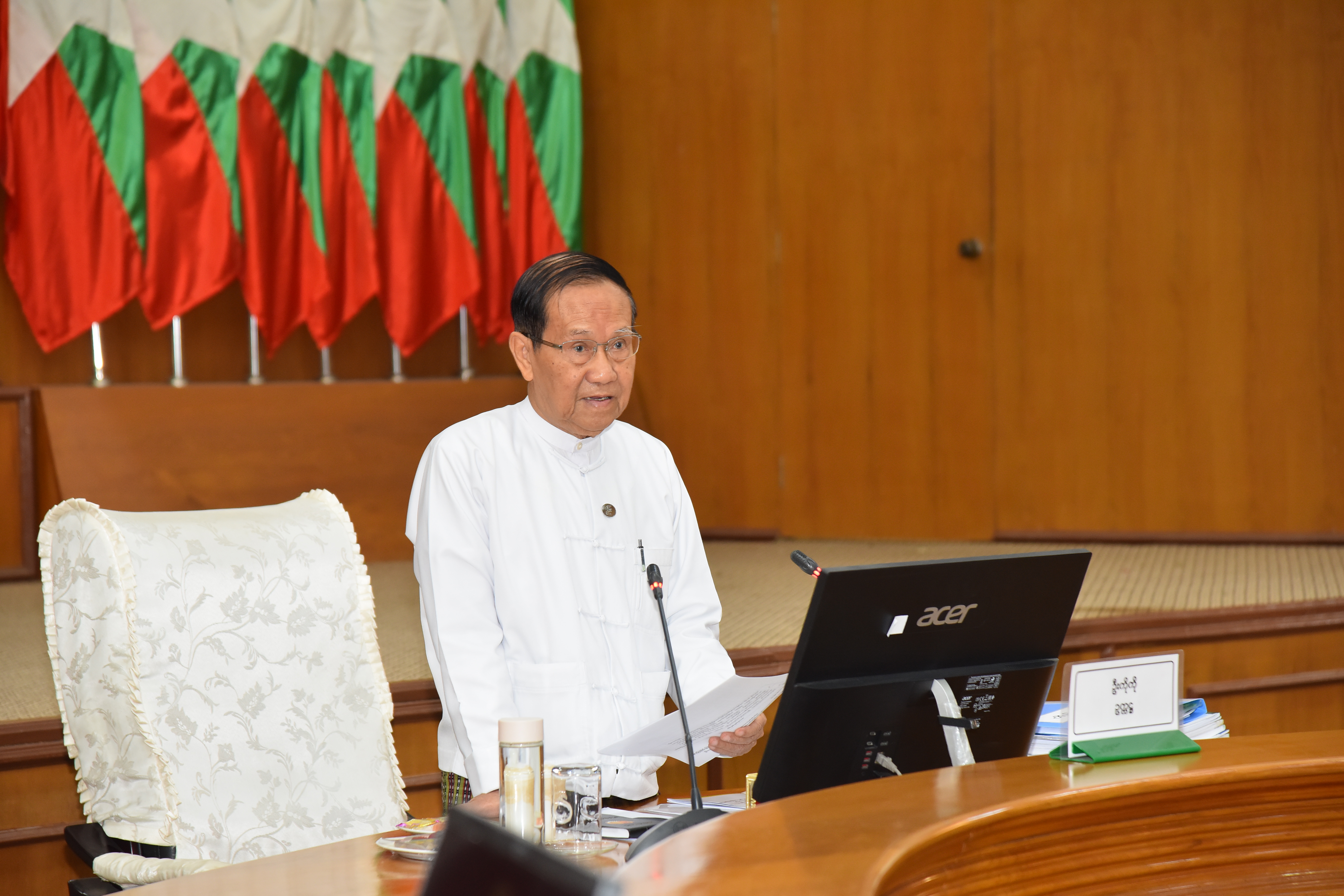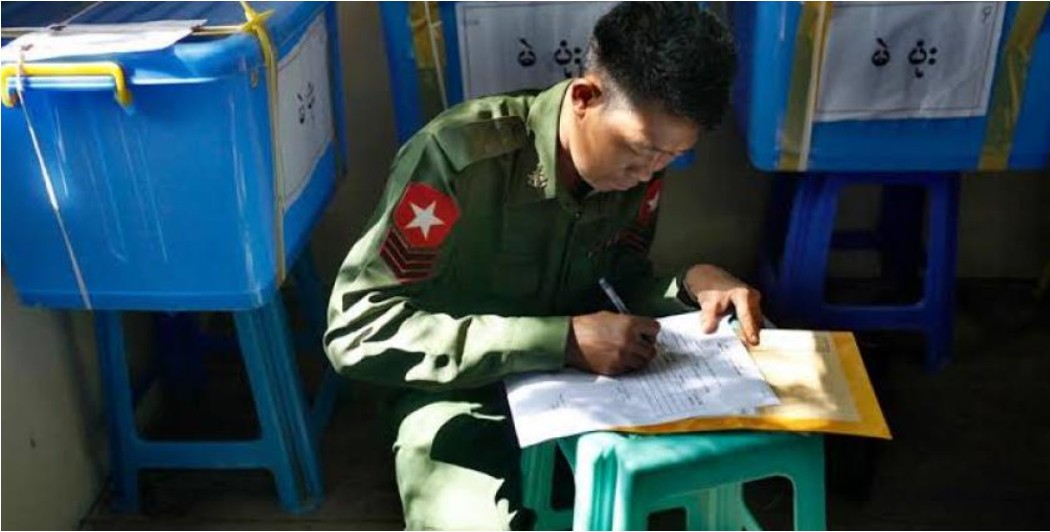CNI Interview
8 August 2025
Senior General Min Aung Hlaing has said that elections will be held in Myanmar in December 2025 and January 2026.
Then, on July 29, 2025, laws were issued to establish the electoral systems for the Region or State Hluttaw, the Amyotha Hluttaw, and the Pyithu Hluttaw, including laws to protect the election.
On the other hand, there has been a decrease in trust in voting machines and are security concerns. Similarly, people are feeling frustrated by the complexity of the election systems.
CNI News contacted and interviewed the Union Election Commission (UEC) regarding these circumstances.
Q: The election was expected to be held under the PR system, but there is controversy because it will be held under the FPTP system. I would like to know why they decided to hold it under the FPTP system.
A: According to Article 109 of the Constitution, 330 representatives are elected to the Pyithu Hluttaw through the FPTP system based on township and population.

U Ko Ko, Chairman of the Union Election Commission
Q: The regional and state Hluttaws will be held using a mixed system of PR and FPTP. So, rather than a voter has to cast a ballot only, it will have to cast multiple votes, won't that cause confusion for the people who will vote? Why is it necessary to use these two systems together?
A: The Amyotha, the regional and state Hluttaws have been iposed to be elected with a mixed proportional representation system, which includes the FPTP system as well as the PR system. A voter needs to cast only one vote. There is no confusion for voters.
It is a system that combines the advantages of the FPTP system with the advantages of the PR system. Even if you don't get a representative with FPTP, you can get a representative with PR.
One representative from each self-administered region and region will be elected to the Amyotha Hluttaw through FPTP. The ethnic representatives to the regional and state Hluttaws will also be elected through FPTP.

While political parties were being explained the voting machine
Q: According to the voting system for the upcoming election, voters must use the machine. However, since Myanmar has a large grassroots population and the elderly are not very tech-savvy, wouldn't it make people confuse to vote by machine and isn't there a decrease in the number of voters?
A: In the upcoming election, MEVM electronic voting machines will be used in all polling stations nationwide. Training courses on how to use the voting machines is being provided in regions and states.
We are working to ensure that voters can vote professionally using voting machines. We are also conducting awareness programs through the media. The system allows voters to vote simply by clicking a button. There should be no confusion or difficulty for the public.
Q: Some people consider that voting machines can technically change the results at will, so it is difficult to trust. So how can the voting machines now be held accountable for producing accurate results?
A: Voting with a machine does not mean that the results can be changed as you like, technically. The machine will record voters' votes and display it accordingly. Voters can also check it out.
Those who don't want the election will say, "I don't believe it" or "It's impossible to get a correct result." The reliability level of these voting machines makes it easy to vote.
The machine displays the votes as they were cast. There are no errors. It is easy, accurate and fast to operate. The correct voting results can be retrieved within minutes and can be checked.
The voting machine does not include Internet, Wifi, or Bluetooth systems. It does not include Windows operating systems (OS) like computers. It is a microcontroller system, so it is a very simple and secure system.

While a voter was preparing to vote
In accordance with the Myanmar Standards Law (2014), we have obtained national-level certification for the quality and standards of voting machines, ensuring the reliability and accountability of the voting machines used in the elections.
Q: Next, I would like to know if the polling stations inside the military compound will be moved outside, or will voting be done inside the military compound?
A: Neither the Election Law nor the Rules and Regulations contain the term “in-military compound polling stations.” Section 36, Sub-section (a) of the Election Law states that “the Commission may determine the number of polling stations to be set up in each ward and village tract as appropriate, depending on the number of eligible voters and the local conditions, or may delegate the responsibility to the relevant sub-commissions at different levels.
Polling station locations are determined based on the number of voters and distance to the station, with the aim of ensuring that eligible voters (including the disabled) living within the ward or village tract can vote easily, that all voters can vote during the designated voting time, and that voting is secret. Election observers are allowed to observe the location of polling stations, the number of polling stations, and the voting process. This has already been stipulated in the rules.
Q: I would like to know if the people can vote at places where they are currently staying in order to avoid losing their right to vote or they must vote at places where they were born.
A: It is important that the public does not lose their right to vote. The voting list will be available where their Household Registration Form (66/6) is listed.
However, there are rules that allow people to vote in the ward, village tract, where they have lived for at least 180 days from the area where the voting list is located. You can apply using Form (3-A) and vote at the location you arrive.

While seeing a Tatmadaw member and ballot boxes
Q: If I am allowed to vote in the area I am in, I would like to know if I can vote by showing my National Identity Card or Smart Card or what other documents/identifications are required.
A: According to the election law, to be eligible to vote, you must be 18 years of age on the day of the election. You must hold a citizenship card, a guest citizenship card, or a naturalization certificate.
You must also be on the voter list. In order to vote at the polling station, you must show your citizenship card, which is your legal proof of citizenship.
Q: The last question I would like to ask is that the security concerns regarding the upcoming elections are so great that it may be difficult for people to come to the polling stations to vote. In this case, they say that the voter turnout may be very low. How can you provide security guarantees? I would like to know if there is a system that allows people to vote from their homes or wherever they are, instead of having to go to the polling station.
A: Security is important for the elections. The government and security and law enforcement agencies will take responsibility for election security. According to the election law, if the security situation for voting is not safe, the election in that constituency can be postponed.
Election security and management issues will be handled systematically. According to the election law, if you are on the advance voter list, you are allowed to vote in advance.
If you are not eligible to vote in advance, you must vote at the polling station.
The law only allows people with leprosy, those suffering from serious illnesses, the elderly, and those who have given birth at home to vote from home in advance.




